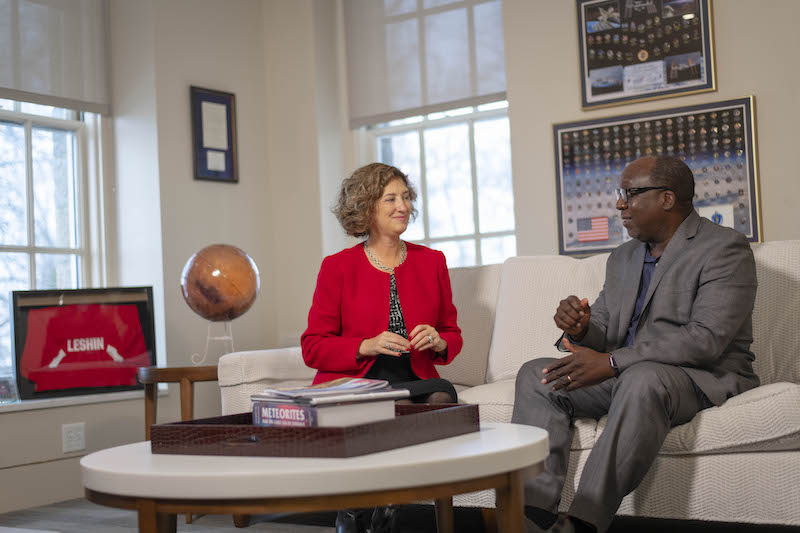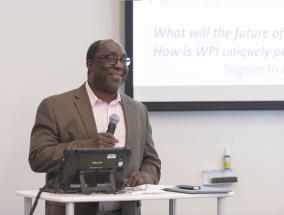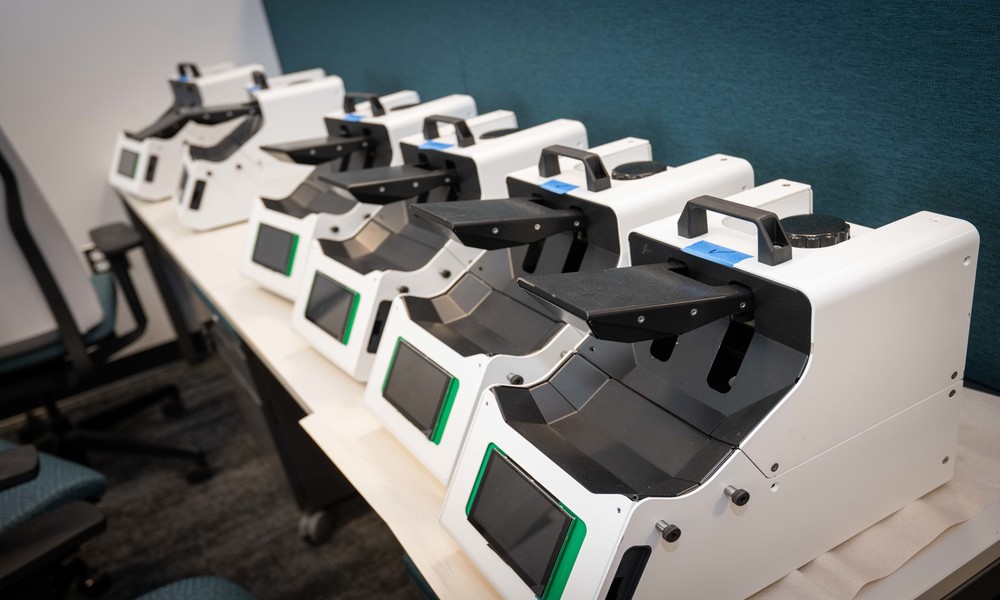WORCESTER, Mass. - February 10, 2021 – Worcester Polytechnic Institute (WPI) Provost and Senior Vice President Winston Oluwole Soboyejo, PhD has been elected to the National Academy of Engineering (NAE). NAE membership is one of the highest professional distinctions accorded to an engineer.
NAE membership honors those who have made outstanding contributions to engineering research, practice, education, or literature and to “the pioneering of new and developing fields of technology, making major advancements in traditional fields of engineering, or developing/implementing innovative approaches to engineering education.” Soboyejo was honored for his work in two of those categories: his contributions to understanding dynamic behavior of materials, and his leadership in STEM outreach in Africa.
“This is an outstanding and well-earned recognition for Provost Soboyejo’s many contributions in engineering research, education, and leadership,” said WPI President Laurie A. Leshin. “His impressive scholarship in the field of materials science is matched only by his dedication to expanding educational opportunities to students everywhere, especially here at WPI and in Africa. He personifies the WPI ideal of purpose-driven education and research. I am truly grateful for his partnership and vision, and I am thrilled that his life’s work is being recognized by the NAE.”

“It is an honor to be elected,” said Soboyejo. “I continue to be inspired by the people I am surrounded by here at WPI and by our global partners who understand the critical importance of science and technology in our changing world. Supporting the next generation of STEM professionals who know and care enough to create solutions to great problems in ways that are informed by global context will ultimately make the world a better place for us all.”
Soboyejo joined WPI in 2016 from Princeton University, where he was a professor of mechanical and aerospace engineering, having already established himself as a renowned materials scientist and engineer. He also brought impressive accomplishments in international development, and a noteworthy record of building global research and educational partnerships. For two years, he served as Dean of WPI’s School of Engineering and became Provost in 2019.
Soboyejo’s research focuses on biomaterials and the use of nanoparticles for the detection and treatment of disease, the mechanical properties of materials, and the use of materials science to promote global development. His recent work includes leading a team of researchers in identifying targeted drugs that reduced the sizes of hard-to-treat breast cancer tumors in mice without inducing the toxic side effects that are typically associated with conventional chemotherapy. An article on that work was published in Scientific Reports in May 2020. He has also led projects that are using science and technology to address global grand challenges in the areas of energy, clean water, affordable housing, and education for people in the developing world.
Beyond the lab, Soboyejo has worked with key stakeholders to help launch The Global School at WPI, which builds upon the university’s longstanding efforts, through project-based learning, to prepare students who are focused on applying science, engineering, and technology to have a significant impact on the major social, technological, ecological, and economic challenges facing people around the world.
He has also helped develop The Center for Global Public Safety, an interdisciplinary research and innovation initiative that brings together industry leaders and universities from around the world to lead an integrated effort to improve global public safety. In addition, Soboyejo has worked with the World Bank and the New Jersey Center for Teaching and Learning in bringing Mathematics and Science for Sub-Saharan Africa (MS4SSA) to campus. Through this initiative, WPI works collaboratively with stakeholders from 20 African countries and over 150 development partners from around the world to explore global best practices and develop strategies to improve STEM opportunities for students. As the COVID-19 pandemic began to sweep the globe in early 2020, MS4SSA was quickly expanded to focus on scaling up the distribution of face masks and face shields to protect health workers from the virus. Partner institutions in Africa were also provided with 3-D printers to co-create ventilators/resuscitators, and medical robots to assist with COVID-19 responses, and received online training at no cost to ramp up production of these medical devices. This work has been integrated with WPI’s most recent efforts in implementing an online institute, with the goal of assisting African universities in restarting classes guided by WPI’s online delivery techniques. This summer 16 WPI faculty and staff trained over 3,500 participants from 109 universities across Africa.
Soboyejo has also worked with the Pan African Materials Institute (PAMI) to bring 40 outstanding PhD scholars from Africa to WPI to further their research efforts in areas such as biomaterials, materials for energy, and multifunctional materials. More recently, he arranged for six African PhD students to study at WPI for two years, courtesy of the Regional Scholarship and Innovation Fund (RSIF) of the African-led Partnership for skills in Applied Sciences, Engineering, and Technology (PASET). WPI is the first university in the U.S. to receive and host these students.
Soboyejo is the author or co-author of four textbooks and nearly 400 papers in peer-reviewed journals. He has had over 180 presentations published in conference proceedings and has edited 20 conference proceedings and journal special issues. He is a Fellow of the American Society of Mechanical Engineers (ASME), American Institute of Medical and Biological Engineering (AIMBE), the Materials Society of Nigeria, the Nigerian Academy of Science, and the African Academy of Science.
Established in 1964, NAE consists of the nation’s premier engineers, who are elected by their peers for seminal contributions to their fields. Operating under the congressional charter granted to the National Academy of Sciences in 1863, the academy provides leadership and guidance to the government on the application of engineering resources to social, economic, and security problems.
Election of new NAE members is the culmination of a yearlong process. The ballot is set in December and the final vote for membership occurs during January. This year 106 new members and 23 international members were elected, which brings the total U.S. membership to 2,355 and the number of international members to 298. Individuals in the newly elected class will be formally inducted during the NAE’s annual meeting on Oct. 3, 2021.
About Worcester Polytechnic Institute
WPI, the global leader in project-based learning, is a distinctive, top-tier technological university founded in 1865 on the principle that students learn most effectively by applying the theory learned in the classroom to the practice of solving real-world problems. Recognized by the National Academy of Engineering with the 2016 Bernard M. Gordon Prize for Innovation in Engineering and Technology Education, WPI’s pioneering project-based curriculum engages undergraduates in solving important scientific, technological, and societal problems throughout their education and at more than 50 project centers around the world. WPI offers more than 50 bachelor’s, master’s, and doctoral degree programs across 16 academic departments in science, engineering, technology, business, the social sciences, and the humanities and arts. Its faculty and students pursue groundbreaking research to meet ongoing challenges in health and biotechnology; robotics and the internet of things; advanced materials and manufacturing; cyber, data, and security systems; learning science; and more. www.wpi.edu






